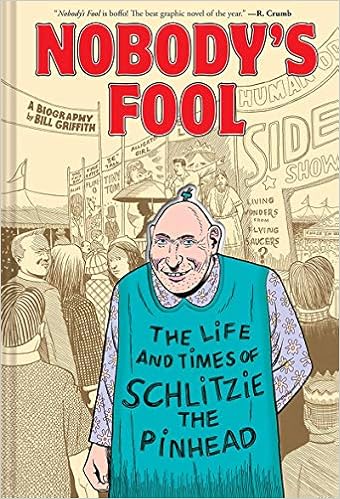
Now that the Bronx Zoo has apologized for putting Oto Benga on display in a monkey house back in 1906 (he suicided in 1916), it may be time to bring up another, later instance of popular Darwinism fastening on an individual in its pursuit of the subhuman, the missing link: Schlitzie (1901-1971).
As told at the Brooklyn Daily Eagle, in a review of Nobody’s Fool: The Life and Times of Schlitzie the Pinhead (2019) by Bill Griffith:
The fool of the title is a circus sideshow performer named Simon Metz — later known as Schlitzie — who was born in 1901 with a birth defect that resulted in a cone-shaped head. His lifetime fame began in 1922 at Coney Island’s Dreamland Circus Side Show, accelerated to a Hollywood film and continued in international entertainment circuits until his death in 1971…
Barkers shocked audiences advertising Schlitzie, the performer, as a “missing link,” “the last of the Aztecs,” and “pinhead.” Audiences reacted hurling “freak,” “cretin” and “moron” at the performer.
John Manbeck, “Schlitzie: The story of a Coney Island performer” at Brooklyn Daily Eagle
Here’s his grave at Queen of heaven Cemetery in Rowland Heights, California.
Metz/Schlitzie was luckier than Oto Benga in that he had a manager who saw to it that he had the means of life.

The Eagle account doesn’t tell us as much about the Darwinian spiel that played out around him, but we learn from Jerry Bergman:
In the annals of sideshow performance, one of the most famous exhibits to “prove” evolution was Schlitzie (1901–1971) a microcephalic (Cantrell 2019). Schlitzie “was one of the top draws in [that] imitators, some even using his name, began to crop up here and there.” (Griffith 2019, 77, 165). Sometimes people with microcephalism were called pejorative names such as “pinheads” or “coneheads.” They had abnormally small brains, were usually intellectually disabled, and displayed many superficial purported ape-like features that made them candidates for the Darwin’s “missing link” label (Snigurowicz 1999).
Schlitzie was also billed “the missing link between Ape and Human” and as “Darwin’s missing link” or even a “Half Monkey, Half Human” man, but mostly “the Missing Link scientists have been seeking since Darwin . . . the Missing Link sought by scientists the world over” (Griffith 2019, 5, 10, 52, 61, 167). He also was for a time billed as Schlitzie “The Monkey Girl” and “The Last of the Incas” (Hartzman 2005, 210). Schlitzie even had a major appearance in the very successful but controversial 1932 film Freaks, directed by Tod Browning, the director of Dracula. He also appeared in the 1941 film Meet Boston Blackie (Hunter 2014, 40).
Jerry Bergman, “Schlitzie the “Missing Link” & Early Darwinian Sideshows” at Answers in Genesis (June 27, 2020)
It’s worth considering that many less-educated people may have learned their Darwinism more from these freak shows than from Darwin-promoting textbooks at school. The shows were more eye-catching and memorable.
See also: Apologies For Displaying An African Man In A Bronx Zoo Monkey House Conveniently Leave Out The Darwinian Motivation